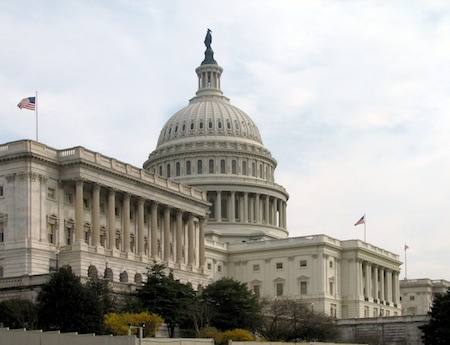Republicans Attack More FCC Regs In Finance Bill

The smarter way to stay on top of broadcasting and cable industry. Sign up below
You are now subscribed
Your newsletter sign-up was successful
Republicans and Democrats took their fight over various FCC proposals and actions to the House floor late Wednesday as they debated the omnibus Financial Services Bill that includes the FCC's appropriation. Democrats tried to block FCC-targeted efforts, but were rebuffed. Republicans even added the FCC's broadband CPNI proposal to the list of actions blocked by the bill.
The House's Republican majority are looking to undo through riders on that must-pass bill what the FCC's Republican minority could not defeat with their dissenting votes, including new net neutrality rules, the set-top box proposal, and the broadband privacy framework, the latter two are not even on the books yet--a divided FCC voted for the proposals, but have yet to vote on final orders.
The bill also prevents the FCC from tightening joint sales agreement rules, as it has proposed in its quadrennial media ownership review circulated last week.
Those proposals are unlikely to make it into legislation that gets past the President's desk given his support for Title II reclassification and "unlocking" set-top boxes in particular.
Democrats tried to head off the Republican efforts with amendments offered on the floor to strike some of the offending FCC portions, but were defeated. The bill as it currently stands would not allow the FCC to spend funds to enforce its Open Internet order until all legal appeals have been exhausted--which could take a couple of years if it goes to the Supreme Court. Rep. Anna Eshoo (D-Calif.), ranking member of the House Communications Subcommittee introduced the amendment to strike the moratorium on funding for the Open Internet order, but it was defeated
There was a fair amount of debate on the provision. Eshoo said that blocking implementation pending a court decision was not longer necessary given that the D.C. Court had weighed in since the bill was drafted, upholding the Open Internet order on all counts. She called it a clear and decisive victory that essentially mooted the provision.
Rep. Ander Crenshaw (R-Fla.), said a legislative stay of the FCC's rules was appropriate given that the net neutrality rules were very controversial. He said nobody disputed the need for a free and open Internet, but he said that was best achieved by the absence of regulatory restrictions and that it was an issue for the courts to decide, adding that litigation was "in no way finished."
The smarter way to stay on top of broadcasting and cable industry. Sign up below
Rep. Jose Serrano (D-N.Y.) said that the Republican majority was trying to hijack the regulatory process for its own ends, which was to increase the profits for ISPs. He said the text of the bill would encourage ISPs to do whatever they could to delay legal resolution.
The baseline bill already blocked implementation of any set-top box order until an impact study has been conducted.
Various legislators have called for such a study before the FCC acts.
But one amendment that was approved was Republican Marsha Blackburn of Tennessee's blocking of funds for the FCC's broadband privacy framework.
Blackburn said the Federal Trade Commission ought to be doing the privacy regulating, not the FCC, calling it a "big government power grab."
The FCC assumed broadband privacy authority from the FTC when it classified ISPs as common carriers, while the FTC continues to regulate edge provider privacy through enforcement of voluntary privacy policies.
Rep. Jerry McNerney (D-Calif.) countered that without strong rules consumers would not have voice over how their sensitive data, like location data, search histories, and purchasing habits was used.
The FCC proposal would require consumer permission (opt in) for sharing such data with third parties. The FTC has no such restriction on how edge providers like search engines and web sites use, share and monetize consumer data.
The Blackburn amendment was adopted the same day the FCC closed the reply comment window on that broadband privacy proposal.
The bill also requires the FCC to publish the text of items 21 days before a vote.
Contributing editor John Eggerton has been an editor and/or writer on media regulation, legislation and policy for over four decades, including covering the FCC, FTC, Congress, the major media trade associations, and the federal courts. In addition to Multichannel News and Broadcasting + Cable, his work has appeared in Radio World, TV Technology, TV Fax, This Week in Consumer Electronics, Variety and the Encyclopedia Britannica.

